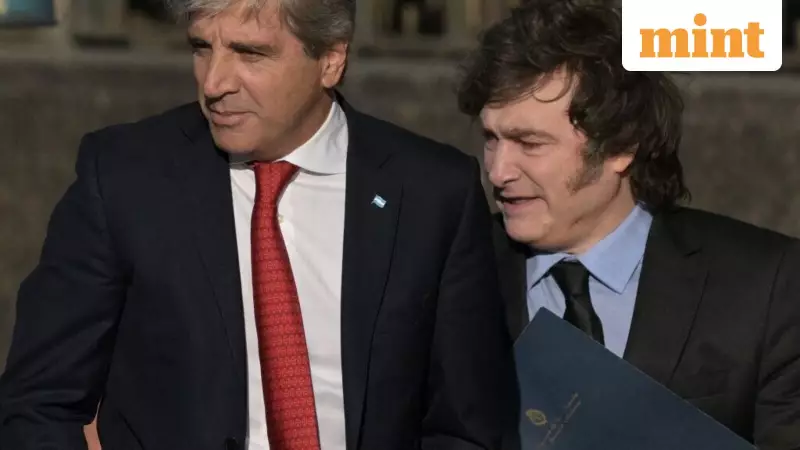
In a dramatic turn of events, Argentina's economic fate is now being shaped by a team of former Wall Street traders who have orchestrated a massive $20 billion American rescue package for the struggling South American nation. The architect of this unprecedented deal is Economy Minister Luis Caputo, once known as the "Lionel Messi of finance" during his tenure at JPMorgan and Deutsche Bank.
The Wall Street Connection Driving Argentina's Recovery
President Javier Milei's administration has packed key economic positions with former financial market professionals, creating what observers call the "JPMorgan boys" team. Caputo, along with Treasury Secretary Scott Bessent—himself a former currency trader—designed the American rescue plan that has already shown positive political results, contributing to Milei's surprisingly strong performance in pivotal midterm elections last month.
The $20 billion currency swap from the Trump administration represents a crucial lifeline for Argentina's peso, allowing the central bank to sell dollars in the market and stabilize the currency. In addition to this massive intervention, the US Treasury injected an estimated $2 billion to prevent a pre-election run on the Argentine peso, with US officials claiming the government actually made a profit from these transactions.
High-Stakes Economic Gamble
The challenge facing Caputo and his team is monumental. Argentina has defaulted on its debt nine times throughout its history, most recently in 2020. The country remains the International Monetary Fund's largest debtor and has consistently failed to generate enough US dollars to maintain currency stability, despite receiving tens of billions in IMF assistance over the years.
Arturo Porzecanski, an American University economist who closely tracks Argentina, noted the irony of the situation: "Both Bessent and Argentina's JPMorgan boys are no longer on the side of brokerage trading desks. They are now trying to steer the market forces they always rode."
Caputo defends his approach of not allowing the peso to float completely freely, arguing that Argentina's foreign-exchange market is too tiny and volatile. "If anyone thinks they can float freely in a market that trades around $100 million or $200 million a day, I think they've never traded in a market," Caputo told business leaders recently.
The JPMorgan Team Behind the Strategy
Caputo's economic team reads like a JPMorgan alumni roster. Key figures include Deputy Minister for Economic Policy José Luis Daza, a US-trained economist and JPMorgan veteran who played a crucial role in negotiations with Bessent due to his Wall Street background. Other former JPMorgan executives in influential positions include Foreign Minister Pablo Quirno and Central Bank Governor Santiago Bausili.
The personal connection between Caputo and Bessent proved instrumental in securing the rescue package. As former traders from the same world who spoke the same language, they were able to craft a solution that conventional diplomats might have struggled to achieve.
This isn't Caputo's first attempt at currency stabilization. He previously led Argentina's central bank in 2018 during former President Mauricio Macri's administration, but resigned after just three months amid pressure from the US and IMF to stop burning through dollar reserves to prop up the peso.
Measuring Success Amid Ongoing Challenges
The Milei administration has already achieved significant progress in taming Argentina's runaway inflation, reducing it to about 30% from more than 200% two years ago. This has been accomplished through drastic spending cuts, red tape reduction, and narrowing the budget gap.
However, the strategy has come at a cost. Argentina's hard-currency reserves have been depleted, creating tension with IMF targets. The country needs to boost reserves by approximately $15 billion by the end of 2026 to meet its commitments, though Caputo insists Argentina will comply and even surpass IMF goals this time.
Joaquín Cottani, who served as Daza's predecessor at the start of the Milei administration, emphasized the critical nature of US intervention: "Without U.S. help, there would have been another currency crisis and perhaps a very different election outcome. The Trump administration put some of its credibility at stake."
The US Treasury expressed confidence in Argentina's direction, with a spokesman noting that "thanks to the prudent fiscal strategy implemented by Minister Caputo and his economic team, Argentina is well on its way to anchoring a prosperous Latin America."
As Argentina continues its high-wire economic act, the world watches to see if these former Wall Street traders can succeed where so many others have failed in stabilizing one of Latin America's most volatile economies.





